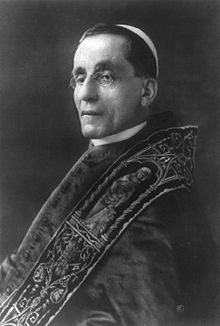The other night I had a dream that I was at a coffee shop and a man dressed like a pope sat in the seat across from me. He told me that he wanted to be my friend. “Who are you?” I asked. He replied that he was Pope Benedict XV. I was very happy but perplexed at this strange encounter.
Dreams can be the result of indigestion or repressed anxieties. In my case, it could have been from the NyQuil that I took to alleviate a runny nose and persistent sore throat. Mystical or not, this dream perked my curiosity. So I did a little research. I was delighted with what I discovered.
Why Benedict?
I originally failed to notice why the current Holy Father chose to carry forth the name of “Benedict.” It is the custom of a pontiff to pick a name of a predecessor who represents their spiritual ideas and mission. Joseph Ratzinger, elected Pope Benedict XVI, told the world in April 2005: I wish to speak of why I chose the name Benedict. Firstly, I remember Pope Benedict XV, that courageous prophet of peace, who guided the Church through turbulent times of war. In his footsteps I place my ministry in the service of reconciliation and harmony between peoples (obtained from Wikipedia).
A Pope who represents peace
Pope Benedict XV reigned during World War I from 1914 to 1922. The guy named Giacomo della Chiesa at birth was described as being a very small and frail in stature.The person in my dream looked very large, perhaps because of his big ideas. I was surprised to discover that he is quoted to be one of the least remembered popes of the 20th Century. But I know that in the upside down Kingdom of Christ, lacking human popularity does not mean less favor with God.
One of the first things that he tried to do as Pope was to appeal for peace and the end of World War I which he called the suicide of central Europe. Throughout this, he maintained strict neutrality. Early on he called for a truce at Christmas. His efforts, which came to be known as the Papal Peace Note, were met with sharp criticism and resistance. Benedict was not included in the peace talks at the conclusion of the war. However, one of his major opponents, Woodrow Wilson ended up incorporating some of Benedict XV’s ideas in the League of Nations.
A Pope who stands for strong devotion to the Blessed Virgin Mary
Pope Benedict XV promoted veneration of the Blessed Virgin Mary. During World War I, he entrusted the world under her care and added the designation “Queen of Peace” to the Litany of Loreto. In response to the suffering and carnage of the ensuing war, on May 5, 1917 he pleaded to the world to have recourse to the Heart of Jesus through the mediation of Mary. Eight days later the apparitions began at Fatima.
He was a proponent of the Marian devotion as proposed by St. Louis Marie de Montfort and promoted devotion to Our Lady of Lourdes. The case for Mary being a Co-Redemptrix is addressed in his Apostolic Letter Inter Soldalica:
As the Blessed Virgin Mary does not seem to participate in the public life of Jesus Christ, and then, suddenly appears at the stations of his cross, she is not there without divine intention. She suffers with her suffering and dying son, almost as if she would have died herself. For the salvation of mankind, she gave up her rights as the mother of her son and sacrificed him for the reconciliation of divine justice, as far as she was permitted to do. Therefore, one can say, she redeemed with Christ the human race (issued 22 March 1918, obtained from Wikipedia).
A Pope not in favor of relativism
Pope Benedict XV coined the term “Dictatorial Relativism.” Relativism basically holds that there is no objective truth and that anything goes. I see relativism as the most dangerous threat to the Christian faith. Cardinal Ratzinger, now Pope Benedict XVI, in carrying out the ideas of his namesake predecessor stated: “Having a clear faith, based on the creed of the church, is often labeled today as a fundamentalism… Whereas relativism, which is letting oneself be tossed and swept along by every wind of teaching, looks like the only attitude acceptable to today’s standards. We are moving toward a dictatorship of relativism which does not recognize anything as for certain and which has as its highest goal one’s own ego and one’s own desires.” (obtained from ctv.ca).
Relativism according to the essay, “In Defense of Discrimination” by Alice Von Hildebrand states: The individual subject is the “measure of all things” (Protagoras)…Truth, moral values, beauty are empty words; what matters is what the individual accepts as true, what he calls morally good, what he likes. It is up to the all-important “me.”
Do we need examples of this happening? Just today I saw an article where a federal judge in Virginia asks if the 10 commandments can be reduced from ten to six. His suggestion is: “Remove the first four commandments, which are clearly religious in nature, and leave the remaining six, which make more secular commands, such as do not kill or steal.” (Obtained from Roanoke Times, May 8, 2012).
What does Benedict mean for us today?
Having a guy like Pope Benedict XV among our repertoire of friends is not such a bad idea especially in light of all of the difficulties and challenges we face in this modern-day. We are still waging war to various degrees throughout the world both physically and spiritually on the home front and abroad. Ideas such as maintaining peace through the storm, having devotion to the Blessed Virgin Mary, and remembering that we have been given a standard for Absolute Truth, are important weapons in our battle.

